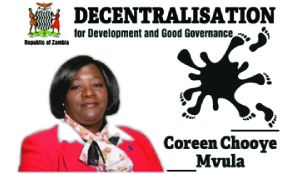 IN accordance with the Ministry of Community Development and Social Welfare (MCDSS) Sector Devolution Plan, community development work in Zambia evolved during the late 1940s as part of the Government’s efforts to rehabilitate the returning service men from the Second World War.
IN accordance with the Ministry of Community Development and Social Welfare (MCDSS) Sector Devolution Plan, community development work in Zambia evolved during the late 1940s as part of the Government’s efforts to rehabilitate the returning service men from the Second World War.
The term community development was used to describe specific efforts in improving housing, roads, food security, hygiene, basic health, levels of literacy; all aimed at reducing poverty.
The focus of Community Development was to impart life sustaining skills such as reading, writing and arithmetic through basic and functional literacy programmes, brick work, carpentry, leather work, blacksmithing, tailoring, basic entrepreneurship and some aspects of sanitation, environmental conservation, agriculture and fisheries.
These skills were being provided at Development Area Training Centers located in each Province, now called Provincial Community Development Skills Training Centers.
In 1964 when Zambia attained its independence, the Government continued with the community development initiatives that were being implemented before independence.
At this time, the mining sector accounted for 95 per cent of export earnings and 45 per cent of national revenue.
However, the poor economic performance from the mid-1970s led to low gross domestic product (GDP). Sharp decline of copper prices on the world market at the time of high oil prices in the 1980s further depressed the Zambian economy.
This situation was compounded by poor performance of other sectors of the economy such as agriculture, tourism and manufacturing industry.
In response to this, the Government at the time initiated a wide range of community development programmes and projects which were carried out on self-help basis.
These included improvement of shelter through the group housing scheme, provision of clean water supply by sinking communal water wells, improvement of infrastructure such as construction of foot bridges, feeder roads, community halls, rural health centres, community schools and improvement of women’s welfare through the formation of women’s clubs.
At that time, the Government’s ideology was that of involving people in national development through the principle of humanism which encouraged members of the society to participate in community development work.
Nevertheless, during the past decade improvements in systems of local governance have been given top priority by many African countries as part of their institutional and public sector reforms.
Almost all African countries have embarked on major reform programmes that have a significant bearing on the governance of both rural and urban areas, as part of the impetus of democratic reforms aimed at enhancing institutional effectiveness and rationalisation as well as extending the space for pluralism and citizen,civil society engagement through local governance reforms in Africa.
Zambia has been implementing a number of community development programmes through state and non-state actors with different interventions.
The current programmes in community development include civic education, information and technology management, livelihood skills development, water and sanitation, food security and nutrition, reproductive health, functional literacy, self help initiatives, income generation activities and cross cutting issues which include, gender based violence, HIV and AIDs, environment management empowerment and disability.
The Government has devolved a major chunk of these functions indicated above to councils as a result of the realisation that Councils are better placed to manage them.
Some of the functions that have been devolved from the Ministry are community development and social welfare.
The specific functional activities will include: identification and implementation of community development projects and programmes; facilitation of women development programmes; facilitation of functional literacy and survival skills development;
development and implementation of Food Security Pack (FSP) Programme and community self-help initiatives
At the Ministry headquarters, there are already significant structural implications for the Department of Community Development as devolution has come into effect in the sense that all functions of the Department have been devolved to the councils except the ones relating to policy or in line with the National Development Plan requirements.
At the community development District Level Offices, there will also be enormous structural implications as all the functions being performed by the Department will be devolved (from within the district) to the councils.
In certain cases, new recruitments will be undertaken by creating new positions for functions that do not have staff to move to councils as a matching resource.
In terms of assets implications, the assets base for the Ministry in general and the Department of Community Development in particular will reduce while that of the councils will increase due to the transfer of the Ministry/Department’s assets to the councils. Any locally generated funds will be transferred to councils from the Department of Community Development.
This scenario will not be very different from other ministries that have devolved functions. What will differ is the magnitude of the functions, assets and human resources to be devolved.
One of the sectors that has huge assets, functions and human resources to devolve to Councils is the Ministry of General Education.
In the next article, we will examine the implications of devolution in the Ministry of General Education to appreciate the impact that devolution will bring about on primary education and primary teachers (who constitute the bulk of staff in this sector) that have been devolved to councils. Primary, Early child Education and Adult Literacy teachers are merely waiting for transfer letters from the Teaching Service Commission to the Local Government Service Commission.
(The author is Assistant Director [Communications] Decentralisation Secretariat, Cabinet Office)






